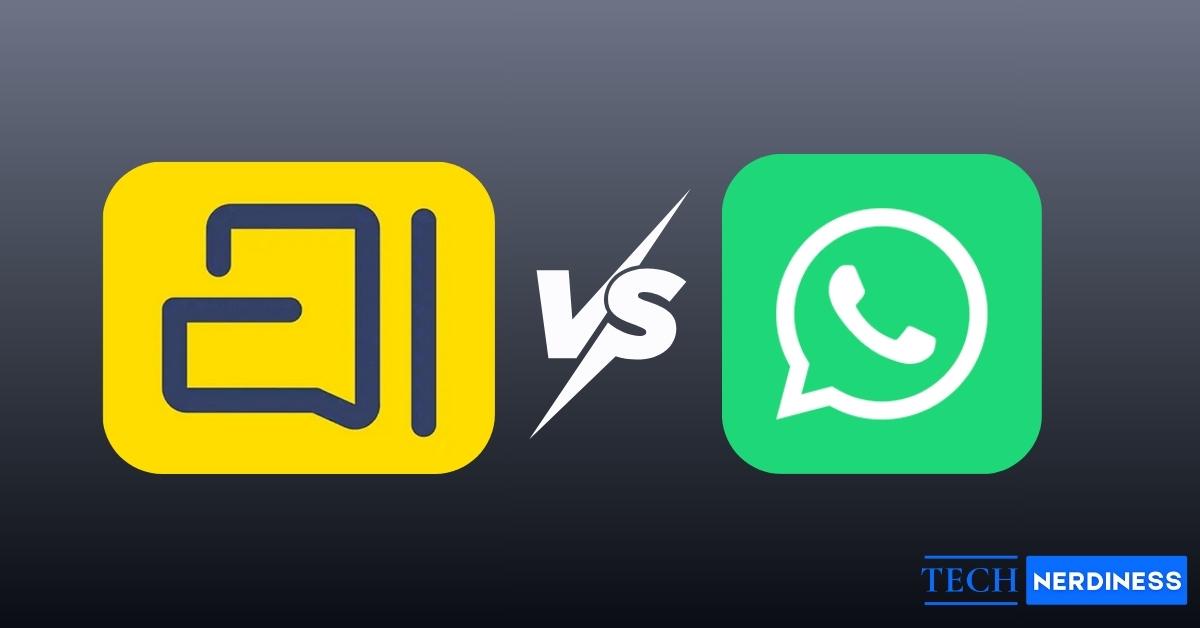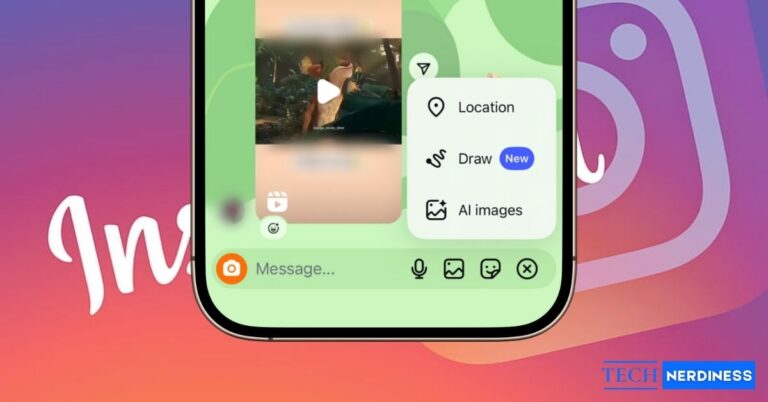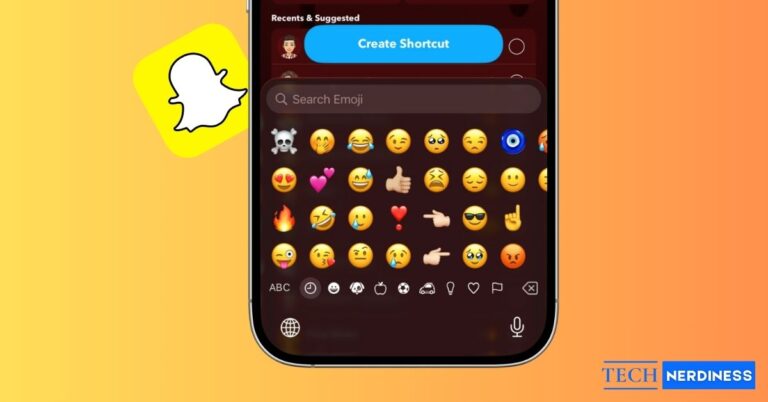Arattai, a Made-in-India messaging app, has been making waves after briefly topping India’s App Store charts. Its name means “chit-chat” in Tamil, reflecting its goal of offering simple, secure conversations. Positioned as a privacy-focused local alternative to WhatsApp, the question is whether it can take on the global giant with over 2 billion users.
In this comparison, we’ll see how Zoho’s Arattai stacks up against Meta’s WhatsApp in features, security, and performance and which app might be the better choice for you.
What is Arattai?
Arattai is Zoho Corporation’s answer to the demand for a homegrown, privacy-focused messaging app. Zoho has long been known for enterprise software, but with Arattai, the company is stepping into the consumer space. They have launched the app as a secure, ad-free, India-centric alternative to global messaging giants like WhatsApp.
Core Features at a Glance
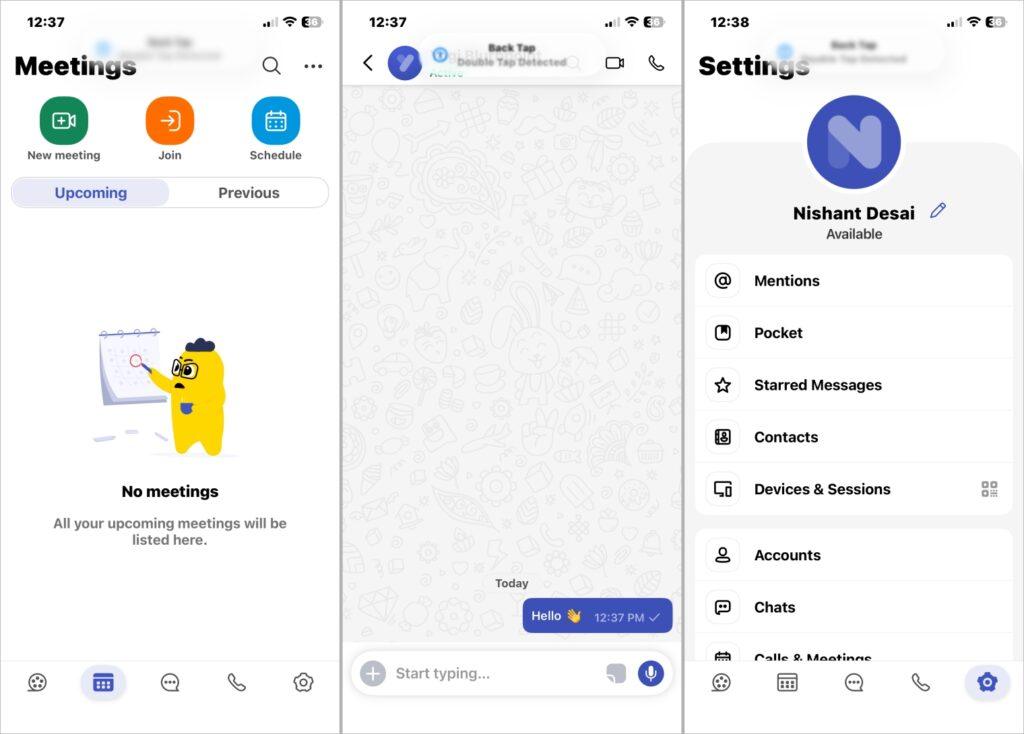
Arattai comes packed with all the essentials you’d expect from a modern chat app, plus a few unique touches:
- Messaging & Calling: Send text messages, voice notes, photos, documents, and videos. Make audio and video calls, even host meetings with up to 250 attendees.
- Groups & Channels: Create group chats with up to 1,000 members, broadcast messages via channels, and share updates with stories (similar to WhatsApp’s Status feature).
- Multi-Device Support: Sync your messages across multiple devices, including Android, iOS, desktop, web, and even Android TV. This makes family chats and media sharing fun on the big screen.
- Accessibility: It’s designed to run smoothly on low-end devices and slower network connections, which makes it ideal for India’s diverse connectivity landscape.
- Price: It’s completely free. There are no ads, no trackers, and no hidden data monetization (at least for now).
The app’s sudden surge in popularity isn’t just a coincidence. Over the past few years, Indian users have shown a growing interest in supporting local products, particularly following privacy controversies surrounding major international apps.
Arattai emphasizes that your conversations stay within India’s digital borders. So, it has seen rapid growth in India, surpassing 1 million downloads in record time.
Arattai vs. WhatsApp: Feature Comparison
| Feature | Arattai | |
|---|---|---|
| Developer | Zoho Corporation (India) | Meta Platforms Inc. (USA) |
| Origin | Made in India | Global |
| Text & Multimedia Messaging | Yes | Yes |
| Voice & Video Calls | Yes (plus built-in Meetings) | Yes |
| Group Chats | Up to 1,000 members | Up to 1,024 members |
| Stickers and Reactions | Yes | Yes |
| Live Location Sharing | Yes | Yes |
| End-to-End Encryption | Available (only for calls right now) | Available |
| Cloud Backup | Local storage & Zoho Cloud | Google Drive / iCloud |
| Status/Stories Feature | Yes | Yes |
| File Sharing Limit | 1 GB | 2 GB |
| Multi-device Support | Yes (five devices at a time) | Yes (Linked Devices) |
| Ads | None | Potential (Business integration) |
| Data Storage Location | India | Global servers |
| User Base | Millions (growing) | 2.5+ billion worldwide |
Security and Privacy: The Make-or-Break Factor
When it comes to messaging apps, privacy isn’t just a feature — it’s the dealbreaker. And this is where Arattai and WhatsApp take noticeably different paths.
WhatsApp’s Edge
WhatsApp uses full end-to-end encryption (E2E) powered by the Signal Protocol, one of the most trusted encryption standards in the world. So, only you and the receiver can read or view the message, call, photo, or video.
It also publishes transparency reports and clearly details its metadata collection policies. That said, while your messages are private, WhatsApp still collects some metadata (such as contact information, usage times, and device details) for operational and security purposes. For most users, that’s an acceptable tradeoff for reliability and global reach.
Arattai’s Approach
Arattai takes a slightly different route. The app offers end-to-end encryption for voice and video calls, but text messages are not yet fully E2E encrypted. Instead, messages are stored securely on Zoho’s Indian-based data centers. This move aimed at keeping user data within national borders.
This has sparked debates among privacy experts. It’s because server-side storage means that data could technically be accessed in response to legal requests. On the positive side, Zoho has a strict “no ads, no trackers” policy, and that philosophy extends to Arattai. The app claims not to sell user data or show targeted ads.
In short:
- If you want strong encryption and a trusted global network, WhatsApp is a solid choice.
- If you want privacy-first, Indian data storage, and no ads, Arattai is the better choice.
Performance, Accessibility, and User Experience
While privacy grabs headlines, performance decides what stays on your phone. And here, both Arattai and WhatsApp have their strengths.
Speed and Efficiency
Arattai’s biggest advantage is its lightweight design. The app is optimized for budget Android phones and slower 2G/3G networks, which makes it a perfect fit for rural India or users with limited data. It runs fast, consumes little storage, and doesn’t drain your battery.
WhatsApp, meanwhile, is slightly heavier because of its more sophisticated features, such as voice note transcription, personalized stickers, reactions, and even payment facilities. It performs well on most recent devices, but can be slow on phones with less RAM. Moreover, the newer features are unsupported by older devices.
Interface
Both applications are simple to use, but they provide different atmospheres.
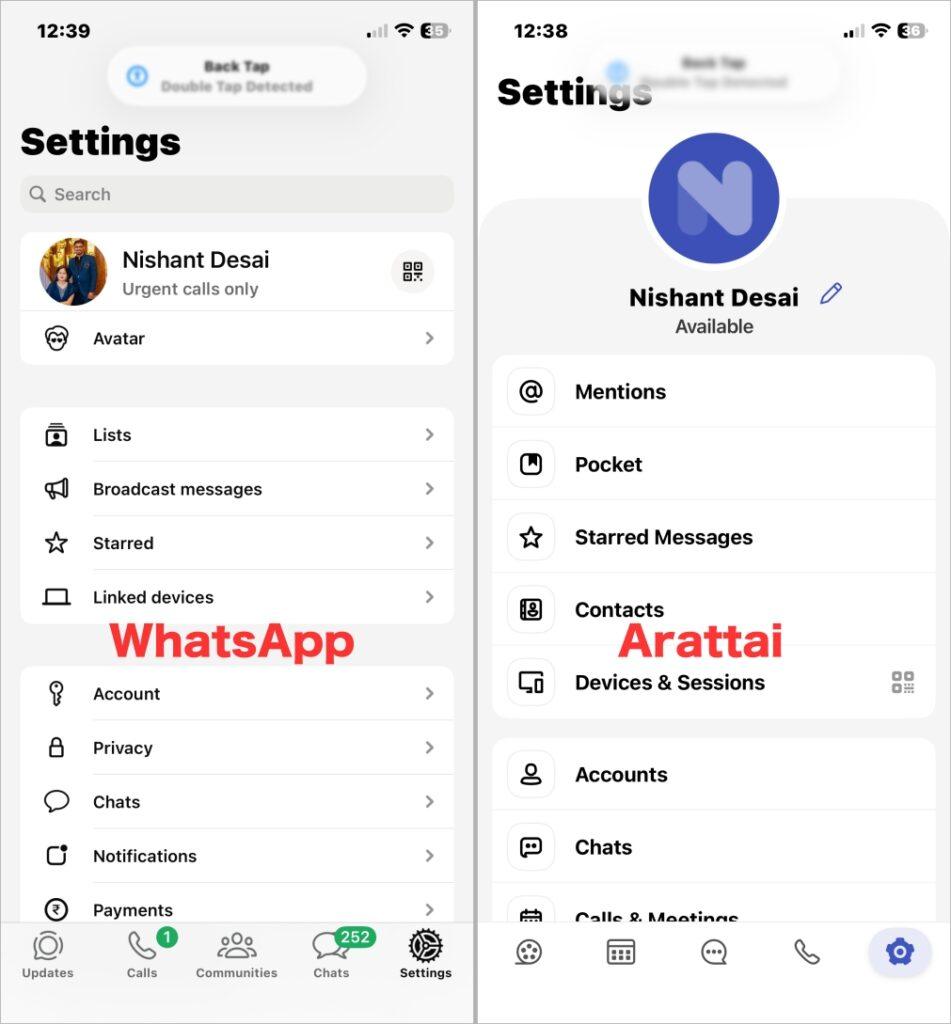
- Arattai is fresh, clean, and distraction-free — no clutter, no ads, just plain conversations.
- WhatsApp is comfortable, which is both a pro and a con. Everyone already knows how to use it, but that same comfort sometimes also makes people less willing to experiment with something else.
Cross-Platform Polish
Arattai boasts a secret ace up its sleeve. You have a specialized Android TV app. So, you are able to watch group videos, family photos, or shared clips on a large screen with one touch. WhatsApp, however, doesn’t provide that. You can cast WhatsApp video to TV, but it is a hack, not a native feature.
So, if you prefer speed and straightforwardness, Arattai is a gem. But for uniformity across devices and a more evolved finesse, WhatsApp takes the usability crown just yet.
User Adoption, Ecosystem, and Future Potential
The finest app in the world can’t do you any good if your friends aren’t using it. And that’s where Arattai has its biggest challenge.
Current Landscape
WhatsApp’s network effect is enormous; almost everyone uses it. It’s no longer just a messaging app; it’s utilized for chatting, business, communities, and even government notifications. Thus, WhatsApp’s enormous ecosystem is unbeatable.
Arattai, on the other hand, is in its early adoption stage. It has crossed 1 million downloads, mainly in India, but the daily active user base remains relatively low. So, it is still a niche platform as against WhatsApp’s 2.5 billion users globally.
Growth Drivers
Arattai has been fueled by both national pride and concerns over privacy. Following a few controversies over WhatsApp privacy and support from Indian ministers and tech leaders provided Arattai with a timely boom.
Additionally, Zoho may soon integrate Arattai with its productivity software, turning it into an all-encompassing collaboration platform as well.
WhatsApp, on the other hand, retains its supremacy due to profound integrations. It’s connected to Facebook, Instagram, and WhatsApp Business, so it’s almost impossible to avoid for social and business interactions.
Challenges Ahead
To grow even more, Arattai has to:
- Scale its servers to support millions of users in parallel seamlessly.
- Increase interoperability, potentially with UPI-like open messaging protocols (something Zoho has teased about).
- Include global-grade encryption and web sync stability.
On WhatsApp, you’ll often see padlock and tick icons confirming encryption and delivery. You can learn more in our breakdown of WhatsApp icons and their meanings.
WhatsApp, on its part, is under antitrust and regulatory pressure in various nations, which could ultimately pave the way for competitors such as Arattai to make strides.
Pros and Cons at a Glance
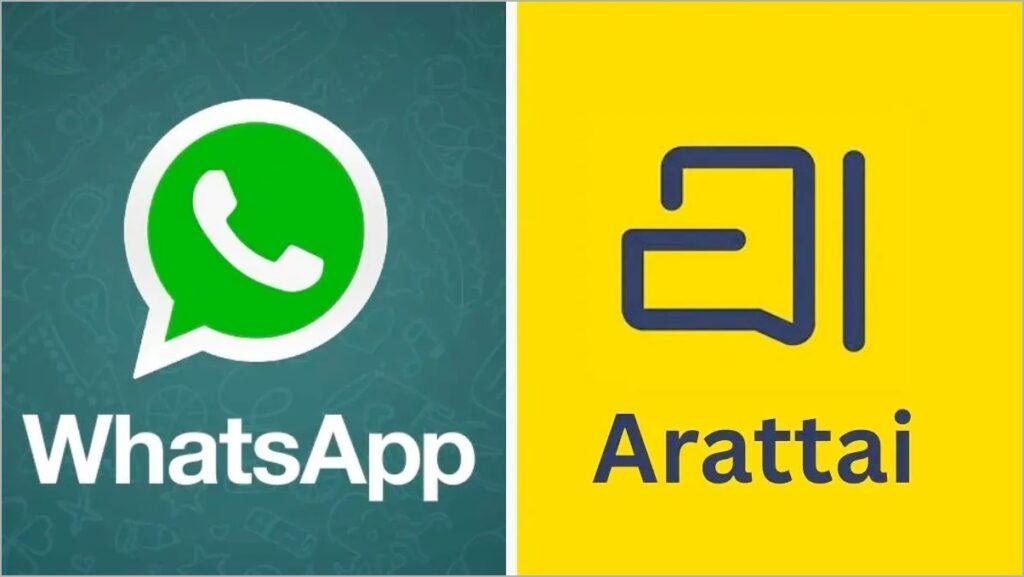
Let’s face it: no app is perfect. Both Arattai and WhatsApp have their wins and weak spots. Here’s how they stack up when you look at the big picture.
Arattai Pros:
- Made in India: built by Zoho, a respected Indian tech powerhouse.
- No ads, no trackers: genuinely privacy-focused, with no creepy algorithms watching your chats.
- Lightweight and fast: perfect for low-end phones and patchy internet.
- Data stays in India: local servers ensure strong data sovereignty.
- Ad-free and clean design: zero clutter, just smooth conversations.
- Unique extras like Android TV support and built-in Meetings.
Arattai Cons:
- Limited user base: you might find few friends using it (for now).
- No full end-to-end encryption for messages: a concern for privacy purists.
- Fewer advanced features: no payments or business tools yet.
- Still evolving: updates are frequent, but the ecosystem is growing gradually.
WhatsApp Pros:
- 2.5 billion users: literally everyone you know is already there.
- Strong end-to-end encryption using the trusted Signal Protocol.
- WhatsApp also offers advanced privacy controls, you can enable Advanced Chat Privacy in WhatsApp for extra protection.
- Feature-rich from payments and communities to business tools.
- Integrated with Meta ecosystem: great for businesses and content creators.
- More languages support, accessibility tools, and third-party integrations available.
WhatsApp Cons:
- Data sharing with Meta: not everyone’s thrilled about that.
- Privacy concerns: metadata is still collected.
- Heavier app footprint: can lag on older or budget phones.
- Potential ads in the future: Meta’s monetization strategy might sneak them in.
Verdict: Which App Should You Use?
So, the big question: which app deserves that prime spot on your phone?
If you’re looking for a reliable, globally connected, feature-packed messaging experience, WhatsApp is still the king. It’s polished, secure (thanks to full encryption), and has become the default communication platform for billions.
But if your heart beats for privacy, simplicity, and “Made in India” innovation, Arattai is absolutely worth trying. It’s fresh, fast, and backed by Zoho’s no-nonsense reputation for protecting user data.
For now, Arattai feels like a promising underdog, ideal for those who want a clean, local, and secure app for private conversations. And while it may not replace WhatsApp overnight, it’s steadily building trust and traction among Indian users.
So, that’s all from my side based on my personal experience of trying both messaging apps. Have you tried Arattai? Let me know about your opinion below in the comments!
FAQs
Not today. WhatsApp offers default end-to-end encryption (E2EE) for all messages and calls using the Signal Protocol. Arattai currently provides E2EE for calls and an optional “Secret/Personal Chat” mode for messages, with full default E2EE for all chats still in rollout plans, per Zoho leadership.
Arattai is developed and owned by Zoho Corporation, an Indian multinational software company founded by Sridhar Vembu and Tony Thomas.
Does Arattai have end-to-end encryption?
Calls are E2E-encrypted. For messaging, Arattai supports an encrypted “Secret/Personal Chat” mode and has publicly committed to bringing default E2EE to all chats soon (not fully default yet).
Can you use Arattai on iPhone and Android?
Yes. Arattai is available on iOS and Android, and also offers desktop/web apps and an Android TV app.
How secure is Arattai compared to Signal?
Signal remains the gold standard for private messaging due to its open-source Signal Protocol, minimal metadata retention, and privacy-by-design features (e.g., Sealed Sender). WhatsApp also uses the Signal Protocol for E2EE by default. Arattai is improving (calls E2E; message E2E expansion planned), but it’s not yet at Signal’s level for default, proven, end-to-end protections across all content.
Is Arattai safe?
Yes — Arattai can be considered “reasonably safe” in many contexts, but with important caveats. It’s not yet perfect, and for high-risk uses you might want something stronger.
You might also like:

